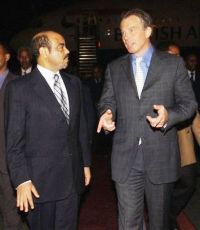Blair in Ethiopia to explore ways of solving roots of conflict and poverty
By ANTHONY MITCHELL, Associated Press Writer
ADDIS ABABA, Ethiopia, Oct 7, 2004 (AP) — British Prime Minister Tony Blair moved from the crisis in Sudan to addressing the roots of conflict and poverty Africa, the only continent to have grown poorer in the last quarter century.

|
|
Britain’s Prime Minister Tony Blair, right, is greeted by Ethiopian Prime Minister Meles Zenawi, left, in Addis Ababa, Wednesday Oct. 6, 2004 where Blair will attend the Commission For Africa meeting this week. (AP) |
Blair was in the Ethiopian capital Thursday to chair the second meeting of his Africa Commission, which is working on recommendations on how to help the continent when Britain takes over the presidency of the Group of Eight industrialized nations.
The British leader has pledged to make tackling Africa’s problems a focal point of his country’s G8 presidency, and his commission’s recommendations are expected to address many of the most pressing issues facing the continent — from the need for good governance, peace and fair trade to improving health care and education for Africans, Blair’s office said.
The need for security on the continent is clear: In the past 50 years, 186 coups and 26 major wars have killed over seven million people and cost Africa US$250 billion (Euro 203 billion). Half a dozen African nations are still troubled by serious conflicts, the United Nations says.
The fallout from one of those conflicts — a 2-1/2 year border war between Ethiopia and Eritrea — was the focus of Blair’s talks late Wednesday with Ethiopian Prime Minister Meles Zenawi.
The war killed an estimated 70,000 people and cost Ethiopia and Eritrea some US$1 million (Euro 810,000) a day. Although the conflict ended with a 2000 peace deal, the border dispute between the two countries was never settled and tensions persist.
Ending the continent’s conflicts, however, is only one part of helping Africa, the only continent to have grown poorer in the past 25 years, the African Union says.
African countries are saddled with US$305 billion (Euro 247 billion) in debts, and their products account for barely two percent of world trade. Investment in the continent has shrunk to US$11 billion (Euro 8.9 billion) a year.
HIV complicates efforts to spur economic growth and development in Africa. More than 26 million Africans are infected with HIV and an estimated 15 million have died from AIDS, including many people from the continent’s relatively small educated and business class.
“What I am concerned about here is not just coming up with a set of proposals but making sure they are then tracked and followed through in their implementation,” Blair told reporters in Ethiopia. “This is no longer a question of donors and recipients, it’s a questions of partnership _ partnership between equals.”
Blair was to join Band Aid star Bob Geldof in Ethiopia for the Africa Commission meeting. The Irish rocker’s fund-raising campaign 20 years ago raised millions in donations from around the world for the starving of Ethiopia.
Blair flew to Ethiopia from neighboring Sudan, where he pressed authorities to end violence in the country’s troubled Darfur region. The United Nations says about 50,000 people have been killed in the area and some 1.4 million others have been forced to flee their homes to escape attacks by pro-government Arab militia.
Blair said Wednesday that Sudan has accepted a five-point cease-fire plan.
The first point calls for a significant expansion of African Union forces in Darfur, where a few hundred AU soldiers have been monitoring a shaky cease-fire among two rebel groups, government troops and allied militia.
“We need several thousand people there in order to monitor any cease-fire,” Blair said after talks with Sudanese President Omar el-Bashir.
The other four points call for the government to identify the location of its troops and munitions in Darfur, to return its troops to barracks in conjunction with a similar withdrawal by rebel forces, to commit itself to reaching a comprehensive peace agreement with the rebels in Darfur and in southern Sudan by Dec. 31, and abide by the humanitarian accords signed with the United Nations.
The Sudanese Foreign Ministry issued a statement afterward saying Sudan was committed to “the leadership role and engagement of the African Union in addressing the situation in Darfur.”
Originally a clash between African farmers and Arab nomads, the conflict has been inflamed by a counterinsurgency in which pro-government Arab militia have waged a campaign of ethnic cleansing against African villagers.
The government denies frequent allegations that it supports the Arab militia, the Janjaweed.
